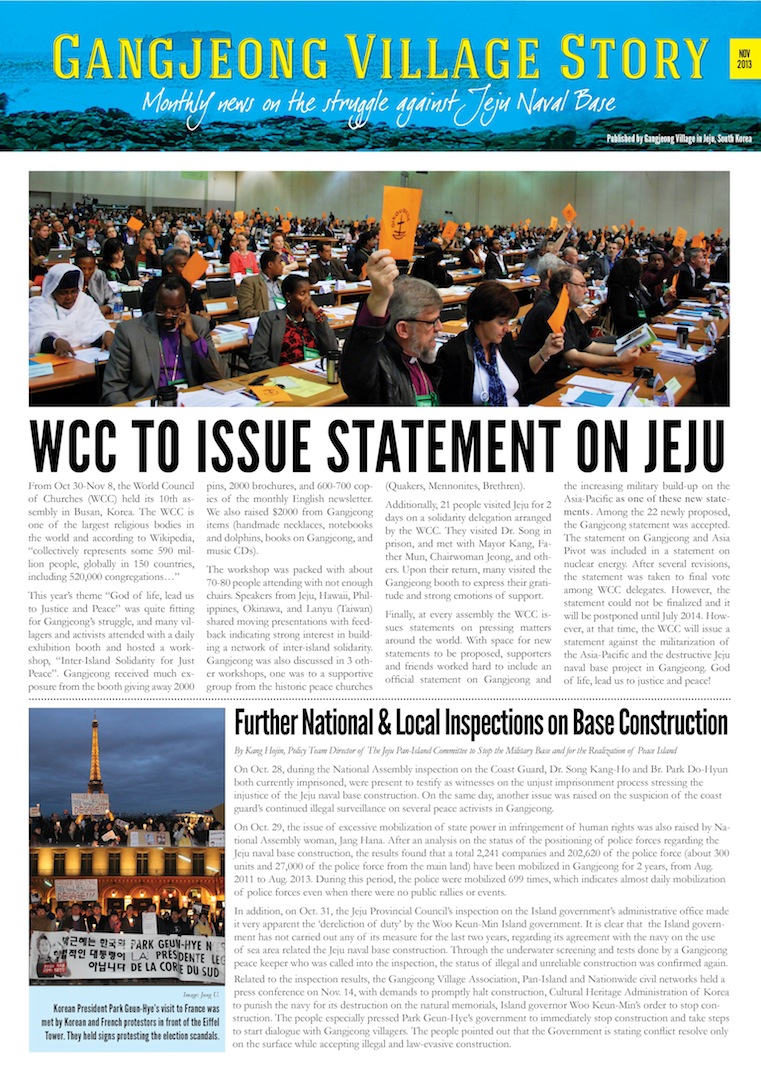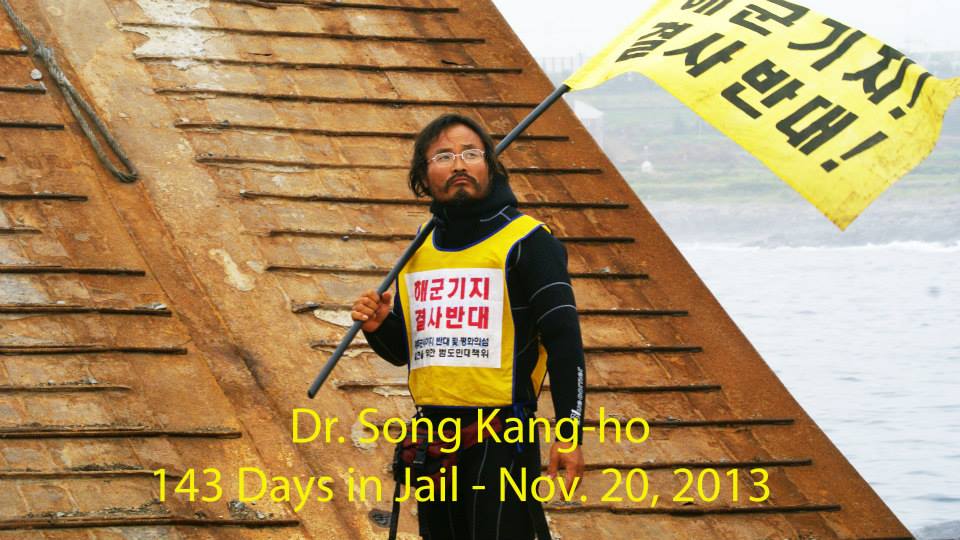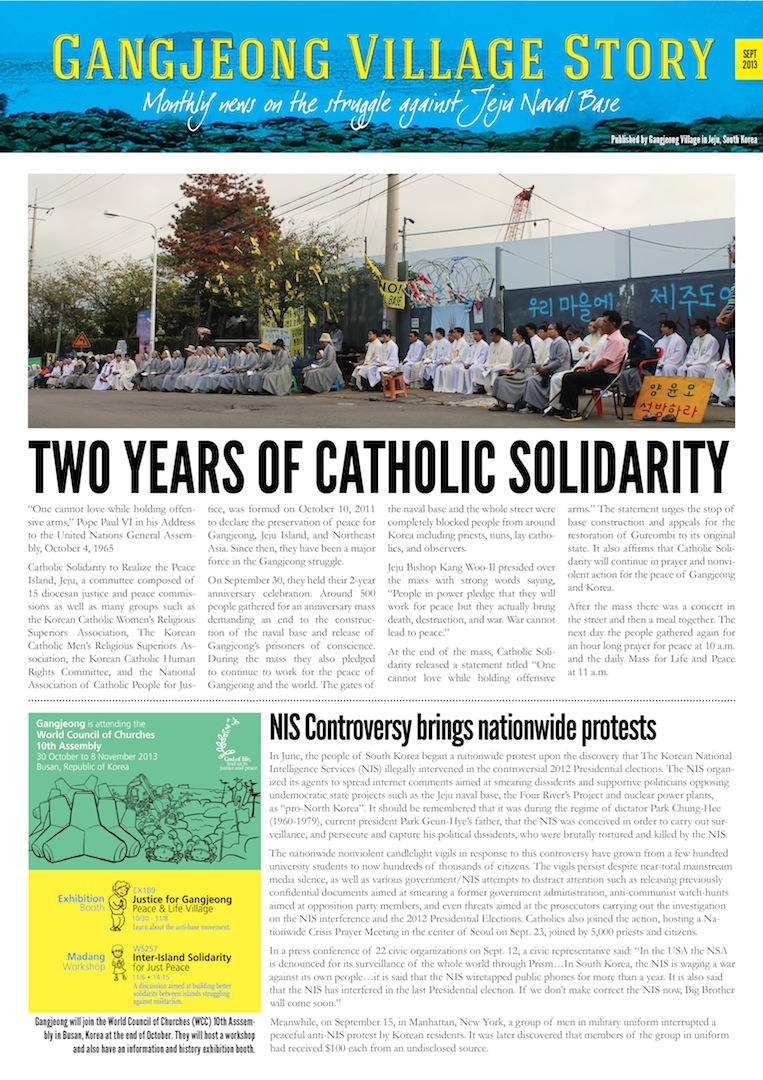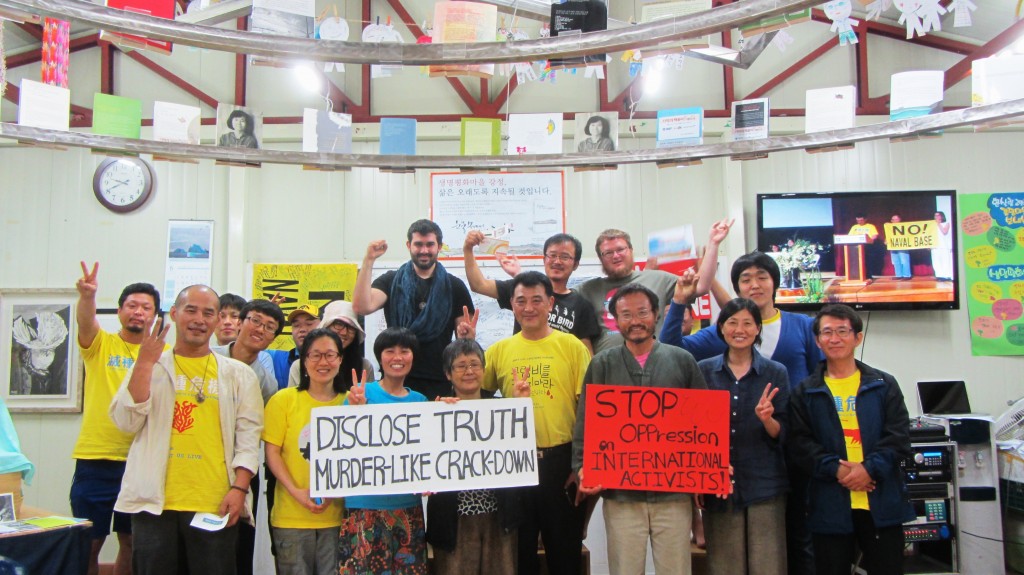In this month’s issue:
Gangjeong at the World Council of Churches, National and local base inspections, Solidarity from Philippines and Christian Peacemaker Teams, Peace for Life Forum and Women’s Pilgrimage Report, prisoner releases, trial updates, and more!
Save Jeju Now
No War Base on the Island of Peace
Tag: Dr. Song Kang-Ho
-
Dr. Song Kang-Ho Released From Prison!
Dr. Song Kang-Ho who has been imprisoned for his opposing activities against the Jeju naval base project for the 3rd time was released on bail on Nov. 29, after 151 prison days. On Nov. 27, the court made a decision of bail on Br. Park Do-Hyun and Dr. Song Kang-Ho. Both had been illegally and unjustly arrested together on July 1, this year. Both refused to be bailed out as the court decision was seemingly too intentionally late and it would not stop them their opposing activities. However, as people strongly urged Dr. Song to be released from jail and paid bailing fee on be half of him without his knowledge, he was eventually released.
Dr. Song Kang-Ho was briefly imprisoned for two weeks in 2011 and jailed again in 2012. In his second imprisonment last year, he lived in jail for 181 days. He leads the Save Our Sea Team, a citizens’ monitoring team opposing the naval base project.
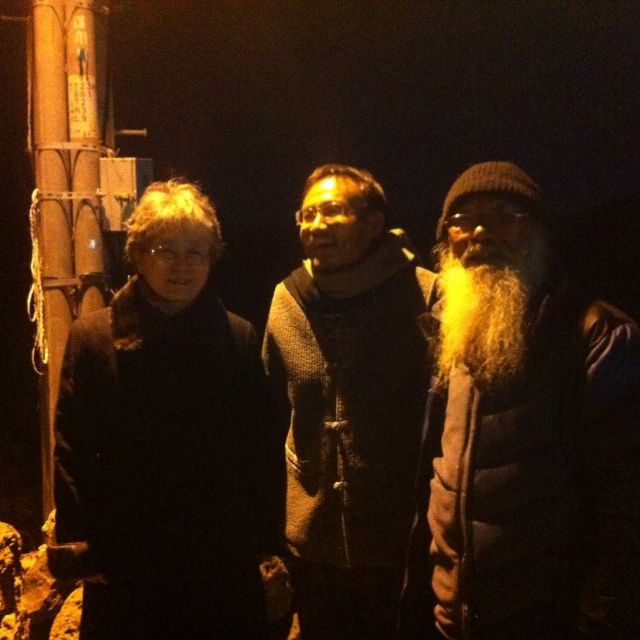
Photo fwd by Save Jeju Now/ Dr. Song Kang-Ho who was released on Nov. 29 was welcomed by his wife, Ms. Cho Jeong-Rae and Fr. Mun Jeong-Hyeon. 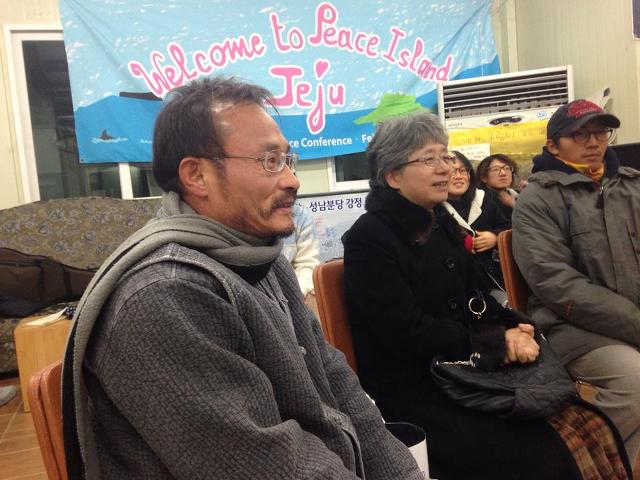
Photo by Choi Hye-Young/ Dr. Song Kang-Ho welcomed in the people’s daily candle vigil in the village Peace Center on Nov. 29 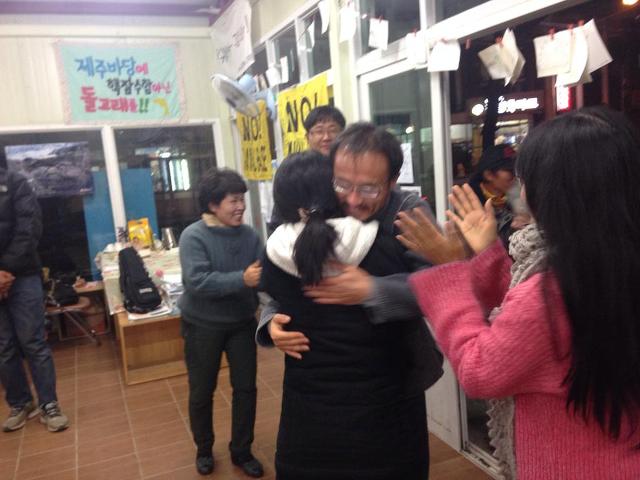
Photo by Choi Hye-Young 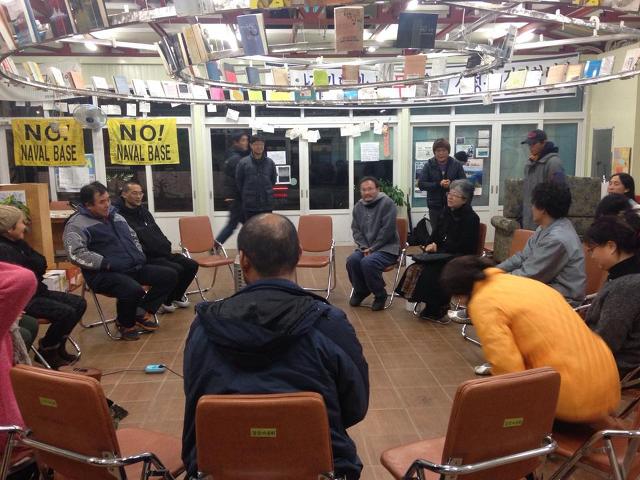
Photo by Choi Hye-Young
-
Free Gangjeong’s Five Peace Prisoners!
Update: Dr. Song Kang-Ho was released on Nov. 29. Please see here. And Mr. Kang Bu-Eon was released on Dec. 3.
Regis Tremblay, a movie director of ‘The Ghosts of Jeju,’ thankfully made these images for the English speakers. Bruce Gagnon writes in his blog:
“These good people are right now languishing inside the jail house on Jeju Island, South Korea. And there are more on the way.
Their crime? Trying to non-violently block the construction vehicles from entering the Navy base “destruction” site in Gangjeong village. In the case of Yang Yoon-Mo he got an 18 month sentence. And many people are being given severe fines to pay.
One activist from Hawaii, who spent considerable time in Gangjeong village in solidarity with the villagers, has reported: “There is no heat for male prisoners (I do not know about the women’s section of the jail) during the frigid months of winter. The conditions are inhumane.”
We can’t ever forget these good people who are fighting for peace, the environment, and human rights. See more at the official Jeju web site Save Jeju Now.‘
# Among the five, Mr. Kang Bu-Eon is a village elder, who has spent lots of time in his childhood on the Gureombi Rock. He had taken care of his sick wife who fell down for a stroke eight years ago. He himself takes four medicines for illness.
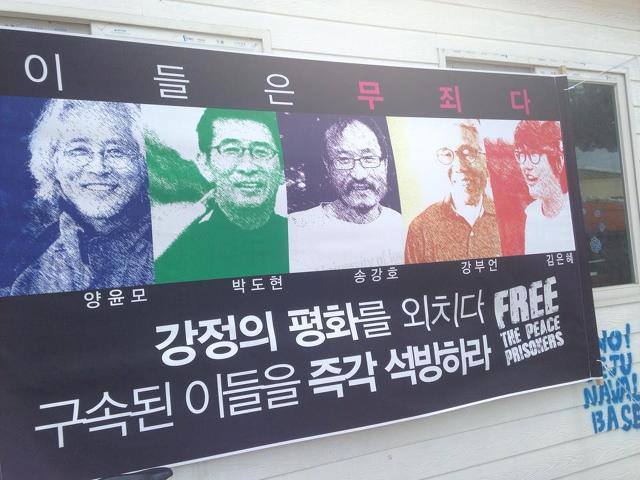
Banner image by Haku Kim/ photo by Choi Hye-Young. The banner reads, “these are no-guilty. Immediately release all the prisoners imprisoned for their crying for the peace of Gangjeong~”
-
Gangjeong International Team Hosts International Solidarity Talkshow
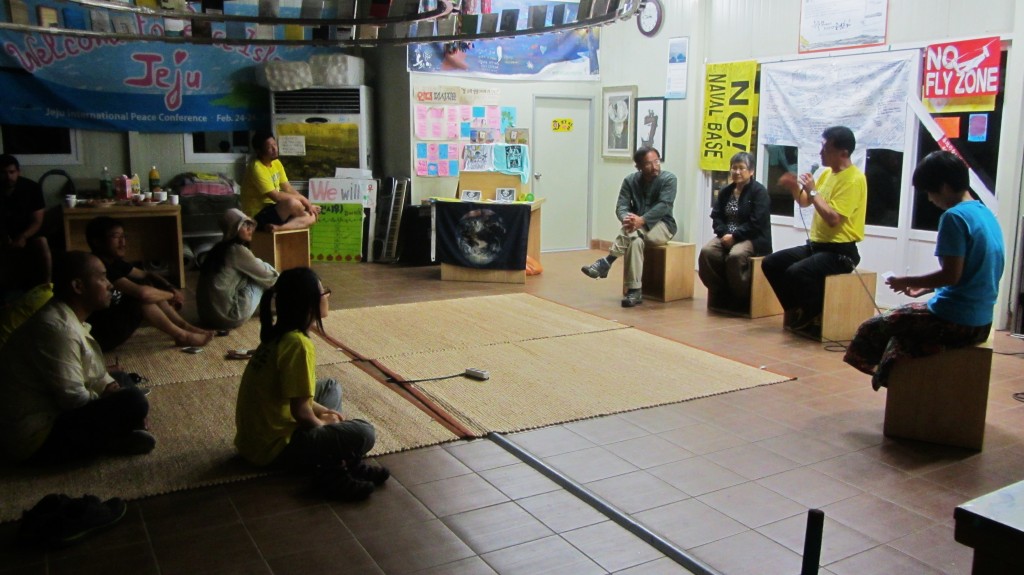
Brother Song, Jeong Young-Hee, and Mayor Kang chat in the Gangjeong Peace Center. On Wednesday, June 12, The Gangjeong International Team hosted an International Solidarity Talkshow during the daily candlelight vigil/gathering time in the Gangjeong Peace Center. The show highlighted recent solidarity trips taken by Gangjeong villagers and activists. There were three guest to the “show”. The first was Mayor Kang, who recently returned from Berkeley, California, where he attended and participated in the Moana Nui 2013 Conference on June 1 and 2. Moana Nui is an international solidarity gathering, hosted of people from by the International Forum on Globalization (IFG) and Pua Mohala I Ka Po, in cooperation with Oceanic Coalition of Northern California (OCNC). The theme was “PEOPLES OF THE PACIFIC–CONFRONTING MILITARIZATION, RESOURCE THEFT, GLOBALIZATION & THE PACIFIC PIVOT”. 45 speakers from 20 nations were there, including Mayor Kang, who spoke about the Gangjeong struggle as a Pacific resistance movment.
Second, Village Women’s Committee Chairwoman Jeong Young-Hee, who recently returned from an extensive speaking tour across the U.S., including Hawaii. For around 20 days starting at the end of April, she visited 6 different areas including Hawaii, Boston, Maine, New York, San Francisco and LA. There she shared about Gangjeong and her personal struggle at a variety of events, including a shared talk with Professor Noam Chomsky. And third, Dr. Song Kang-Ho (Brother Song) who has just come back from a trip to Okinawa. He was invited for May 18 which was the 40th anniversary of the reversion of Okinawa from U.S. Control back to Japanese administration. Aside from joining the events, he visited many areas to share about Jeju and talk about the movement for demilitarized peace island solidarity. For International Team member Silver was the host and emcee for the night, creating both a fun and thoughtful atmosphere. The “stage” was decorated with signed flags and signs of solidarity which the guests brought back with them.
The evening began with a trivia contest, with questions related to trips or the trip areas. Prizes included Jeju tangerine chocolate, solidarity t-shirts, and Indonesian coffee. After that each person was asked to give a 5 minute summary of their trip with pictures if they had them. It closed with a question and answer time.
During his talk and while answering questions, Mayor Kang said that he was impressed by the progressive atmosphere of Berkeley and felt that although it was home to many nobel prize winners, many people lived very frugally and not in a flashy manner. He also shared that he met many people from across the pacific ocean especially from small islands, and from them he found that they too were suffering like Jeju because of the endless pursuit of capital, neo-liberalism, and militarism. And they were all victims of war during WW2. He said that America claims they are working for “world security” with a “peace force” but in reality they are tormenting these small islands. He said he believes that Inter-Island Solidarity for Just Peace, beginning with a triangle of Okinawa, Taiwan, and Jeju is possible, because at the conference he felt a pressing need for forging bonds of solidarity at the conference. He also shared that in Berkeley there was a large 2000 year-old-tree which had a large hole in it that he could even climb inside. They were conserving that tree there and he was impressed and respected their effort to preserve their environment. On the other hand, I felt sad that America keeps its own values but at the same time seeks to destroy others values.
Among other things, Chairwoman Jeong told a story about an almost 70 year old native woman activist who she met in Hawaii and was very impressed by. She lost her parents when she was very young. Even back when her grandfather was still alive, that time was the 100th anniversary of U.S. colonization of Hawaii. Until now she has been working with dedication to recover Hawaii and has been to prison for her struggle. Also she met many Korean-American activists in the U.S. and was very impressed that even though Gangjeong is not their hometown they work hard to fight for Gangjeong. She said she was encouraged a lot by many American’s support for the Gangjeong struggle, but at the same time many overseas Koreans and Korean-Americans who were indifferent. She said that she even yelled at one guy who seems like a Korean government agent. She also shared that she learned a lot from the experience and she hoped that other villagers would get a chance to do the same.
Finally, Brother Song talked about the similarities between Jeju, Taiwan, and Okinawa. He said that all of them have similar histories and are suffering by powerful countries in similar ways. In the effort to create the Inter-Island Solidarity for Just Peace Movement, he suggested that we start with these three places as a “trial triangle”. He told the story of an island controlled by Taiwan called “Lanyu” were China discarded nuclear waste there without discussion. It is ironic that all of the most beautiful islands are destroyed by powerful nations. He then shared that the islands which are weaker than Jeju need our solidarity and experience. Meanwhile, Okinawa which has fought for more than 68 years has managed to get some land back from bases but all the land is very polluted. However, more than land contamination, spiritual contamination is more dangerous. In Okinawa, there is an place called, “American Village” where the land has been returned. But the land was contaminated and the economy was dependent on the base, so the people struggled and eventually created an American style village to service U.S. military members, so that they could survive. He said that we need a strong vision for peace so that even if our land is contaminated and the base is built our spirit will not be contaminated. For example, in Gangjeong we can create spaces for peace activists to migrate, give land for refugees, build a peace park, and do peace education, basically creating one big peace village. To gather islands for the Inter-Island Solidarity for Just Peace movement, he suggested sailing on a boat between the islands. He also invited people from around the world to join the every-seven-year-event of the WCC (World Council of Churches) in Busan, Korea this October, where Gangjeong and the Inter-Island Solidarity for Just Peace Movement will be holding a workshop during the forum.
-
UN Special Rapporteur on Human Rights Visits Gangjeong
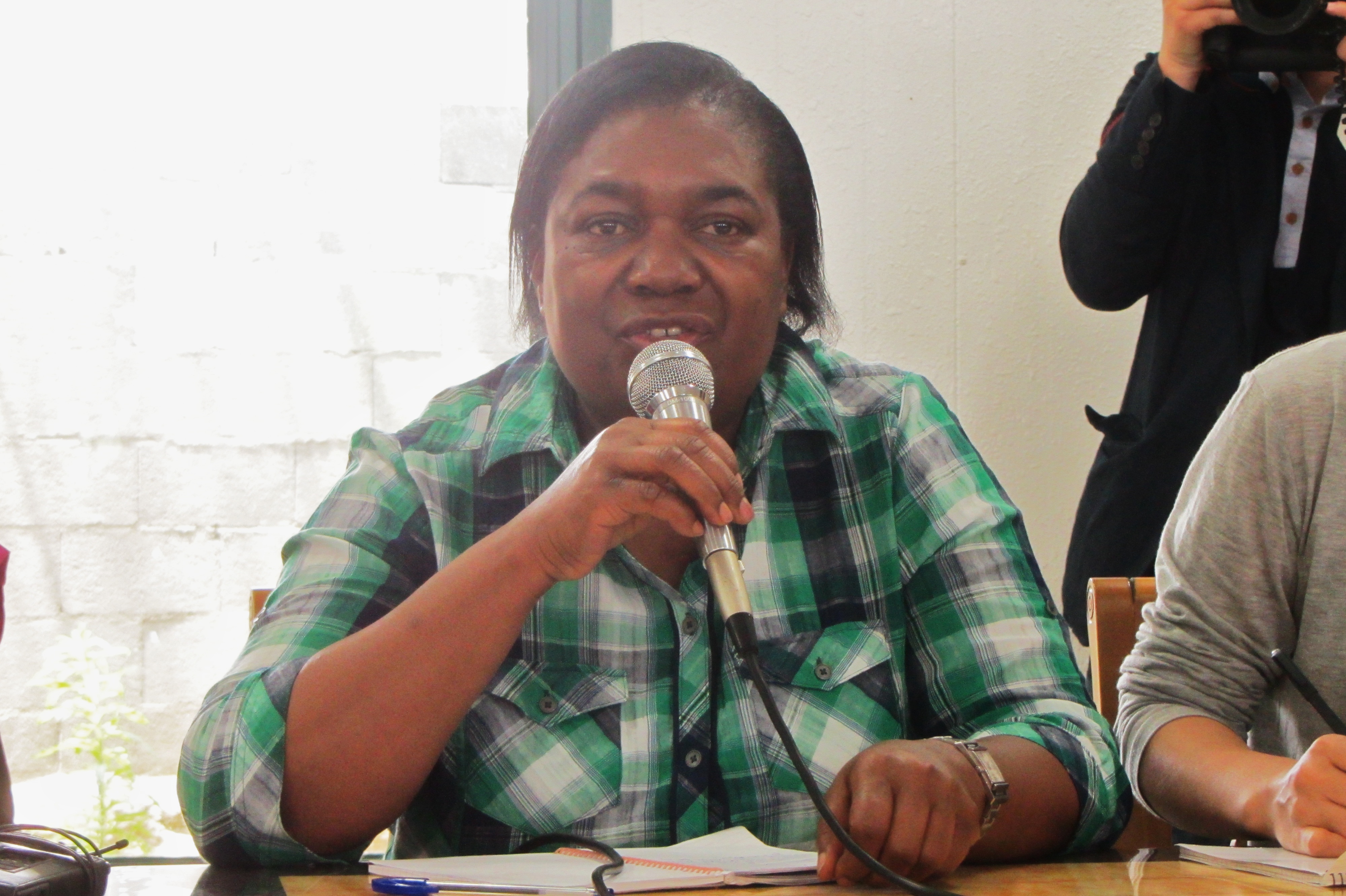
Margaret Sekaggya, UN Special Rapporteur on Human Rights, Introduces herself to Gangjeong residents. On June 4, 2013 Margaret Sekaggya, UN Special Rapporteur on Human Rights, visited Gangjeong to meet with villagers and activists and see the situation. The visit came as part of a two week visit to South Korea, visiting Korea’s unfortunately numerous sites of struggle for human rights and justice, such as Milyang and Gangjeong.
In the afternoon, from 1 p.m. to 3 p.m. a meeting was held in the village ceremonial hall with the villagers and activists to hear of their struggle. Sekaggya said that she will take her findings from her visit to Korea and would compile a report to be released in March of 2014. At that time the report will be released to the Human Rights Council in Geneva as well as to the Korean government and publicly.
Upon her arrival many reporters and broadcast news personnel were waiting but following a brief introduction were made to leave and the doors were shut, so that the villagers could speak in private without press intimidation.
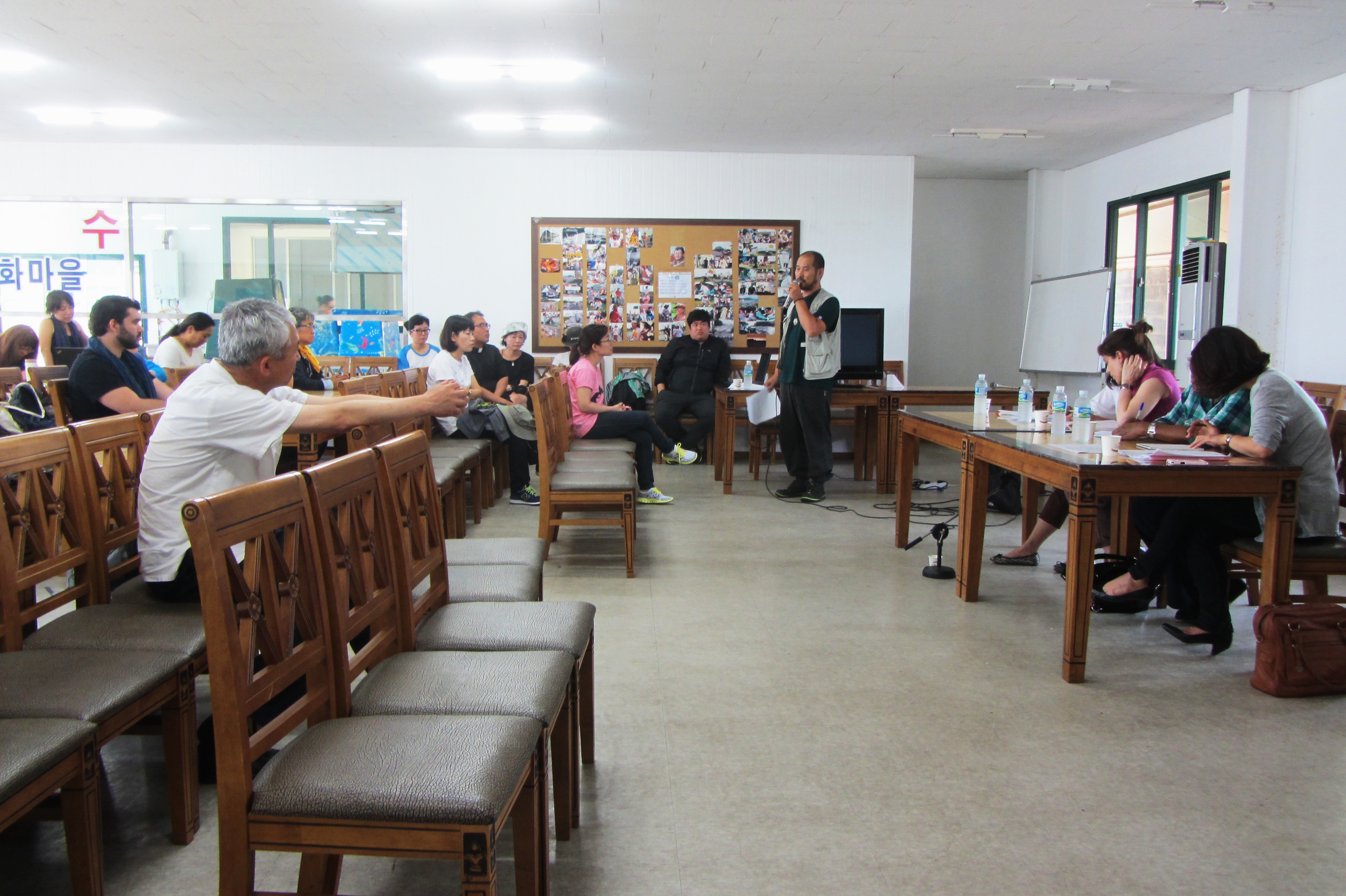
Village Anti-Base Committee Chairman, Goh Gwon-Il, begins the proceedings. The proceedings were emceed by Village Anti-Base Committee Chairman, Goh Gwon-Il who began giving a detailed overview of the history and facts of Gangjeong and the base project until now, such as the first fake vote and the second real vote where 94 percent of the 725 villagers in attendance voted against the base.
Descriptions of military, construction, and police harassment of villagers and activists followed. A video from 2011 of naval soldiers harassing and fighting with villagers was shown. Then a video of the 4-on-1 water assault on and beating of Dr. Song Kang-Ho by Coast Guard SSU Special Unite Divers in 2011. Next a video was shown of Villagers and activists attempted to climb a barge to talk to the workers and navy, and being beaten and pushed from the boat by workers and the navy.
Next videos were shown of the recent crackdown on the sit-in tents near the gate, including the near hanging on Mayor Kang by careless police and public workers, as well as the police pushing Villager Mi-Lyang off a 6 meter high ledge. Then Mi-Lyang, who is still in the hospital for recovery, came to give her testimony of the situation. It was clearly very difficult for her to speak of the recent traumatic event.
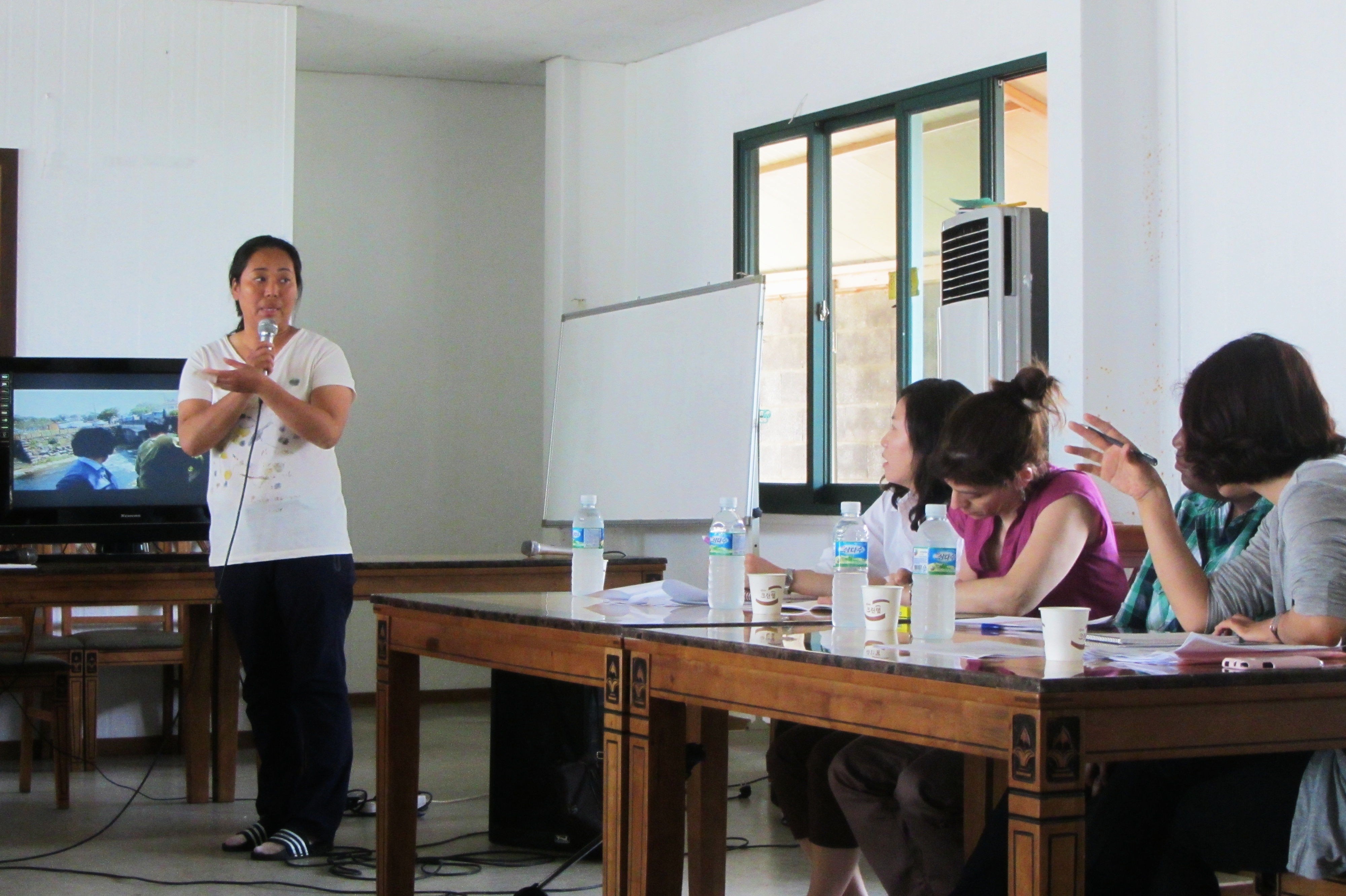
Villager Kim Mi-Lyang tells about her traumatic fall at the ends of the police. Then, Catholic Fr. Kim Sung-Hwan came to speak about and show videos of the oppression on the Catholics, including the near death of Father Mun in April of 2012 as well as the pushing over of Father Mun during communion destroying the sacraments, general police oppression and disruption of the daily catholic mass, including the outrageous use of pepper spray on those attending the mass.
Next, tangerine farmer and chairwoman of the Village Women’s Committee to Stop the Base, Jeong Young-Hee, came to talk about and show pictures and videos of further struggles and injuries from police violence as well as base construction pollution damage to crops. After that, Activist Bok-Hee came and talked about oppression on activists including the police and security thug violence at the construction gates, displaying the many injuries. She also emphasized the double standard, that when there are many cameras or visitors, the police are very gentle and polite but when no one is looking they are violent and rude. Next, Activist Youn-Ae came and gave a personal testimony about her life as an anti-base activist and oppression she has faced in Gangjeong.
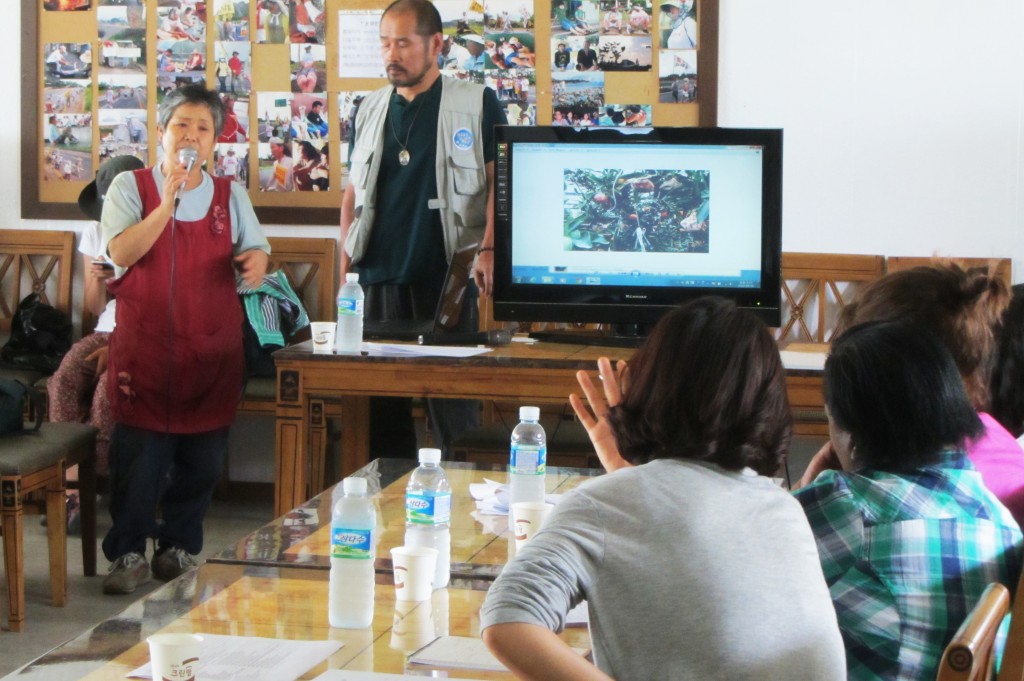
Tangerine farmer and chairwoman of the Village Women’s Committee to Stop the Base, Jeong Young-Hee addresses the panel. Finally, Activist Sung-Hee came and talked about oppression on internationals, emphasizing detail the stories of Benjamin Monnet and Angie Zelter who were targeted and forcefully deported. She also talked about the recent re-entry denial of long-term Taiwanese Gangjeong resident, Emily Wang, as well as the more than 20 other entry denials and deportations related the anti-base struggle.
After the nearly two hours of detailed explanation by Gangjeong villagers and activists there was a general question and answer time. The UN visitors thanked the people for their testimonies and information and asked what kind of things they would like to see in the report, such as concrete statements or actions or resolutions. Although there wasn’t much time to comment 5 people responded with suggestions.
Finally, Margaret Sekaggya thanked everyone again and apologized for the short time. She also said she felt very well received and also thanked the organizers for organizing everything so well. In the end, she wished the people the best in their continued struggle. Then she went out for a short tour of the village before departure.
-
The 4th prisoner against naval base, this year
1. Mr. Lee Jong-Hwa, a poet and peace activist, is to be imprisoned.
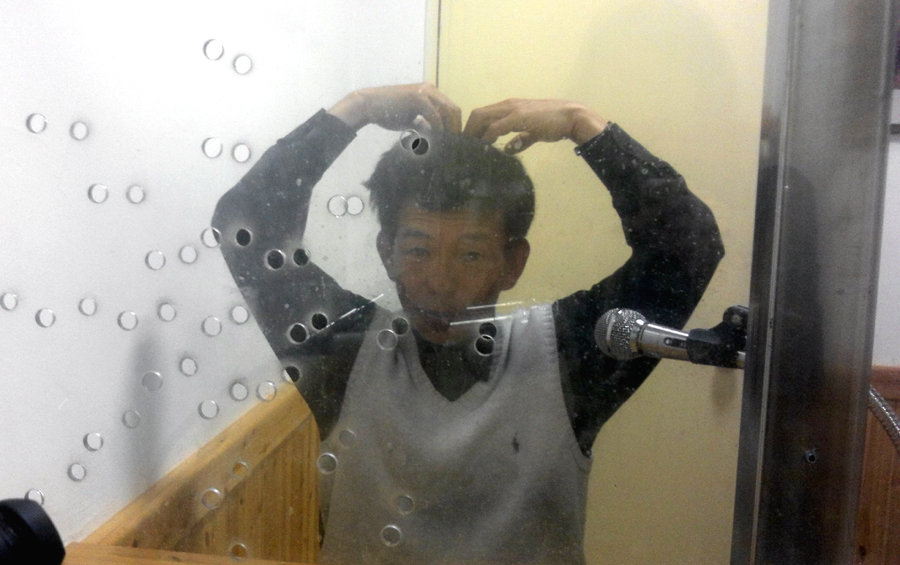
Mr. Lee Jong-Hwa gesturing “I love Gangjeong,” with his hands in the Dongbu Police Station, Jeju, on April 30. Hours later, he got the arrest warrant from the court. He would be moved to the Jeju Prison on May 3. Mr. Lee Jong-Hwa is a poet, writer and peace activist with a good-nature smile, lots of humor and tear. He is the poet who loves travel but now he is to be jailed. The first book he asked people in the police station where he is currently held was a Korean and English language dictionaries.
He was arrested on April 28, Sunday, got the arrest warrant from the court on April 30.
He would be the 4th prisoner this year after Yang Yoon-Mo (arrested directly from the court on Feb. 1), Mr. Park Sung-Soo (volunteered to be jailed instead paying fines on March 25. He was released on April 1) and Mr. Kim Young-Jae (arrested on April 12).
He would be also the 21st prisoner in relation to the naval base. The total numbers of imprisonment are more than that as several people have been repeated jailed: For example, Yang Yoon-Mo.
Mr. Lee Jong-Hwa is told to be moved to the Jeju Prison on Friday, May 3.
According to an activist who met him in the Custody room of the Dongbu Police Station where he is currently held on May 1, He expressed his strong will saying that, “I want neither review of legality for confinement nor bail. Mine was a just protest to illegal construction (destruction), as I am a member of environment group. My 100 bows were what I could do against unjust state power. In my own way, I will prepare for trials, while reading and writing.”
He explained the situation of his arrest on April 28:
“I had no intention to be arrested on the day. However, I sat in front of a gate to protest to police ravage on Catholic mass and 100 bows. I was also protesting to the new Seogwipo Police Station chief who was haughty enough to say, “shot them [with harmful fire extinguishers].” I was to carry on 100 bows, the police interrupted me. So I sat on in protest. When a mass started, I became to naturally join the mass but the mass was also interrupted, too.”
It was his 6th arrest. Some people suspect that he had been targeted by the police, like Kim Young-Jae, since there was something that was not easily understandable when he was arrested: The truck seemed to intentionally move behind him as if he is clearly doing so called ‘obstruction of business,’ some people have pointed it out.
Videos by Leejesu
Mr. Lee Jong-Hwa’s wish to remaining people in the field is that 100 bows should be continuously carried on:
“The 100 bows in Gangjeong were initiated by the group, Life and Peace Fellowship, mainly by the Buddhist leaders like Dobup. I am a Catholic devotee. However, I have spread the compact disks of 100 bows narrative to many places including workers’ protest sites. It is to build the space for union.”

Photo by Mr. Lee Jong-Hwa/ Students in 100 bows with their teacher, Gangjeong, April 27, 2013, just a day before his arrest. 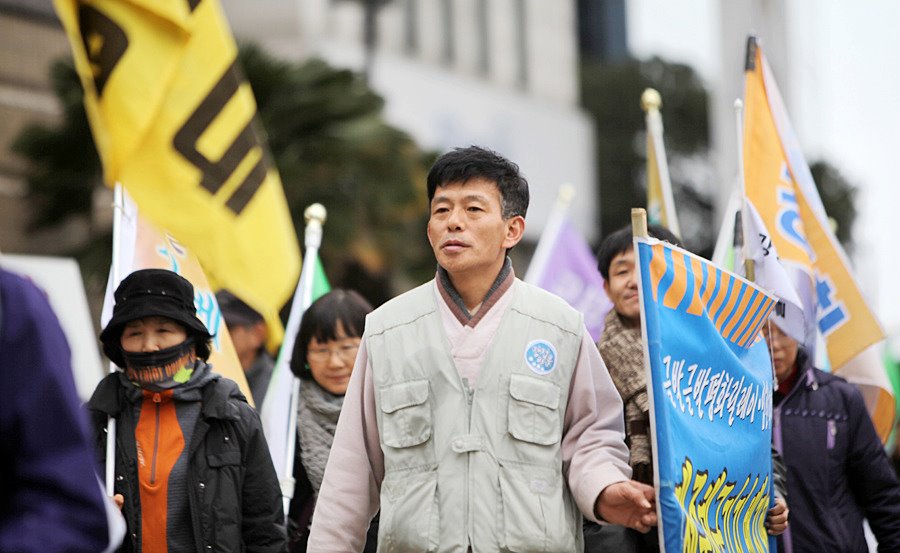
Photo by Cho Sung-Bong (source)/ Mr. Lee Jong-Hwa joins the writers’ march from Dec. 26, 2011 to Jan. 20, 2012. 2. Update on Yang Yoon-Mo on his 90th day in prison
Yang Yoon-Mo (57, prisoner No. 301) who was directly arrested from the appeal court met his 90th prison day as of April 30. He got 1 year and six months actual sentence on the day. The Supreme court dismissed his case on April 26, confirming the unjust decision of appeal court.
As he has already lived in prison for two months(2011), 42 days(2012), and three months(as of April, 2013), he left about 1 year.
Here are his words on the final court decision on the dismissal of his case:
“ I think that the judges did not consider enough as they see the political situation as security state. Didn’t they simply dismiss my case, considering it as a kind of security case? I considered re-final appeal. But I knew there are not enough lawyer force [for the struggle] so I didn’t.
I criticize unilateral legal application that drives struggle opposing the naval base as security case. However the essence of the event comes from the corrupt state and government officers.
In my case, it is a resistance to improper legal procedures. It is a protest to the government officers robbing residents’ properties and depriving the people’s basic right and right to happiness. It is wrong that they applied crime to me. Their investigation way is to presuppose that I am a criminal. I will file for an appeal to Constitution.”
He will start to eat rice from May 1, after the recovering period with rice gruel since the end of 52 days’ fast on March 24.
Regarding the case of Yang Yoon-Mo, you may refer to UN Special Rapporteurs’ joint allegation letter to South Korean government on human rights violations in Gangjeong, Jeju.

A new building is being built across the Jeju prison. People say the Jeju branch of the National Intelligence Service moved its location from the downtown of Jeju City to here. 3. Mr. Kim Young-Jae’s prison letter on April 25.
As of April 30, Mr. Kim Young-Jae (41, prison No. 435) got his 19th day in prison. In his April 25 letter to his senior in the village, he wrote as the below. These are translated excerpts:
I guess that many people were embarrassed by my arrest and imprisonment. However I am fine, different from your concern about me.
It is because I have been preparing for this, expecting my imprisonment long time ago.
During the investigation process, I felt that they had really decided their mind to arrest me. That is why I am more concerning about the peace keepers in Gangjeong.
I strongly feel that they want to arrest and imprison peacekeepers, so that they remove the power for the opposition movement against the Jeju naval base construction. Please particularly heed them.
When I was in the field in Gangjeong, I could not see very well. However, a little distant from it, I become to realize the things that I could not think before.
I become to see how this opposition movement against the Jeju naval base has continuity and meaning in the history of democracy, peace, and unification movements that have been heartbreaking and continuous for tens of years in Korea; and how I am and which position I stand on in those movements. It is becoming really precious time. [..]
Even though I am confined in a small single room, my heart is freer and happier than any other time.
There could be no regret since I have acted according to my consciousness and faith.
Tomorrow (April 26), there is a trial on the case of climbing up to the caisson dock in Hwasoon on last September 6. (* Mr. Kim Young-Jae was one of the five activists on the day)
I will see welcome faces. I wait for tomorrow.
Please tell all the peace keepers that I miss them so much. Please tell them not to be shrunken, not to be exhausted but fight with happiness.
P.S. Please say my special hello to the village uncles. I love them.”

A two-page prison letter by Mr. Kim Young-Jae on April 25, 2013. Source. 4. The military wielding violence to civilians are not punished while the civilians are.
Nine villagers and peace activists got the court decision of probation on April 30. They have been charged of obstruction of business etc. when they entered into naval base construction area in protest of the navy’s violence on Dr. Song Kang-Ho on June 20, 2011.
On the day. Dr. Song Kang-Ho and some people climbed up to a construction barge on the Gangjeong Sea in protest to illegal destruction without restoration of damaged silt protectors. At the time, Dr. Song was hit by the navy personnel during the process.
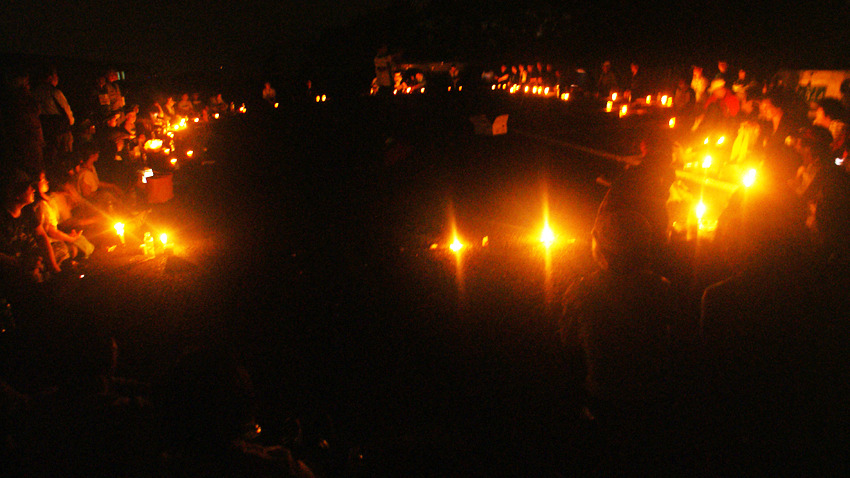
Photo by Cho Sung-Bong/ People ran into and took sit-in in the naval base project committee building complex to protest the navy’s violence to Dr. Song Kang-Ho etc. on June 20, 2011. For more of Cho’s photos on the day, see here. The criminal department of the Jeju District Court sentenced three people with six months’ imprisonment but two years’ probation while six people, with four months imprisonment but 1 year probation respectively.
Prof. Shin Yong-In, a law Professor of the Jeju University was infuriated to hear the result of court decision to say that:
“Is it persuasive by common sense that a subject who hit the other is are not punished but the people who protest to it are rather punished?
Furthermore, the subject is the soldier(navy). Military personnel’s violence on civilian is prohibited even during the war time. It is clearly a criminal activity. Does it make sense that the soldier who hit the civilian is never punished but the people who protest to it are rather punished?
Video by Cho Sung-Bong (source): Dr. Song is hit by the navy on June 20, 2011.
-
March 16th day: The return of Dr. Song Kang-Ho and People’s Assembly at Silsangsa temple in Jirisan mountain.
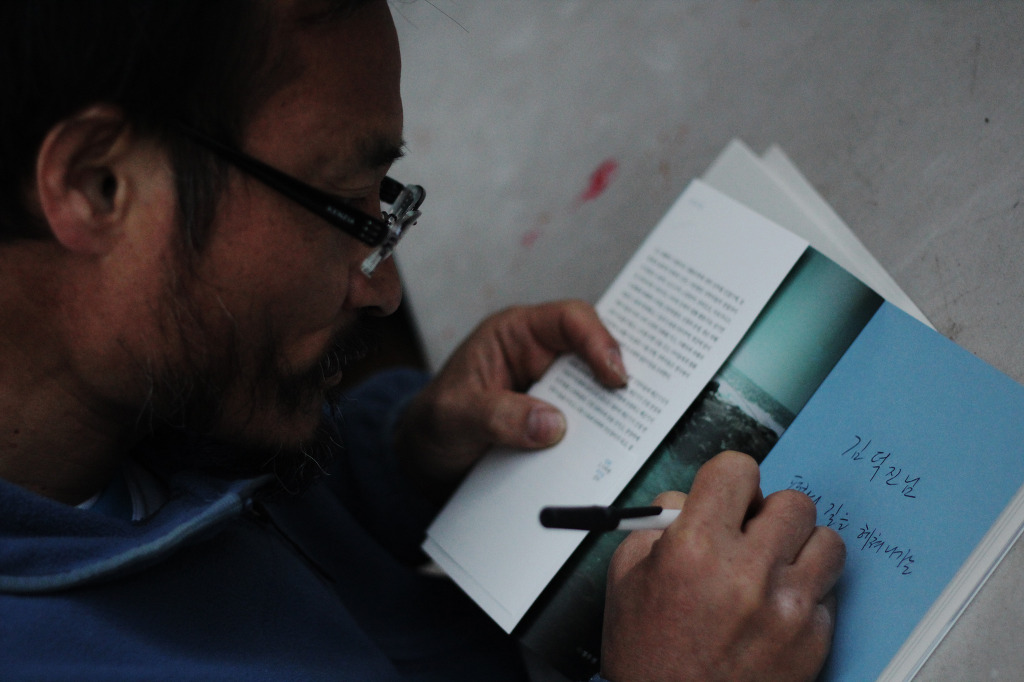
Photo by Lee Wooki. See also here. The return of Dr. Song Kang-Ho and People’s Assembly at Silsangsa temple in Jirisan mountain. . .Br. Song has returned after about 6 months imprisonment. . .About 500 people we have met during the march: the evicted, dispossessed, dismissed grassroot people gathered to talk about “Our Life, Our Priority(Option) and Our Solution” in the name of People’s Assembly. . .from Gangjeong, Yongsan, Ssangyong, Four major rivers. nuclear power plant and power transmission tower, super-supermarket victims and irregular workers. Film by Dunguree 박성수
